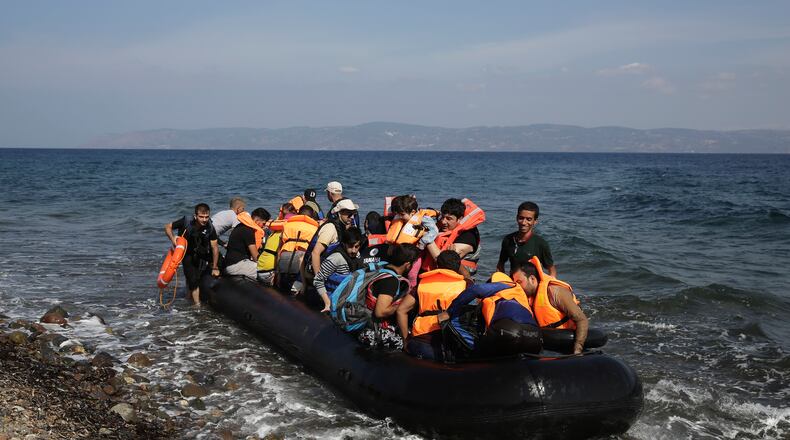Barack Obama ran for president in 2008 on being -- in many ways, but most especially in regard to foreign policy -- the anti-George W. Bush. As the humanitarian and refugee crisis pouring out of the Middle East we abandoned under Obama continues unabated, the question now is what the anti-Obama foreign policy looks like.
The famous photo of the lifeless body of 3-year-old Aylan Kurdi on a beach in Turkey has focused attention on the catastrophe in the boy's native Syria. But as heartbreaking as that image is, to be shocked by it requires one to have ignored the reports from that country's four-year-old civil war. I mean the reports of the Assad regime's repeated use of not only chemical weapons, but such barbaric "conventional" weapons as the barrels of nails, glass, rebar and other shrapnel rained down on civilian areas. It's to ignore that scores of refugees have been dying on capsized boats in the Mediterranean, while those who survive are flooding across European borders by the tens of thousands.
Meanwhile, the debate Obama oversaw regarding Syria is illustrative of his disastrous foreign policy more broadly.
Obama famously (and during a re-election campaign that relied heavily on promoting foreign-policy successes) drew an ill-advised "red line" at the use of chemical weapons by Assad, even though some 100,000 civilians had already been killed by that point. Then, after a year passed with zero effort by the administration to prepare Congress or our allies for a possible response in the event chemical weapons were used, Obama was caught flat-footed when his tough talk didn't dissuade Assad from crossing the line. The president first said he didn't need congressional authority to act, then backed down and belatedly tried to win congressional support for an effort his own aides described as "just muscular enough not to get mocked" and "just enough to be more than symbolic." In the end, he couldn't make a credible case for any action whatsoever; even those of us who recognized inaction would have consequences could not find a reason to trust that Obama's plan was worth supporting. His "just enough" approach looked like the road to Libya, a land that already stood in lawless ruin by then. The administration's subsequent approach to countering ISIS has been equally uninspiring.
All of which points to the question I mentioned at the outset. If Bush's full invasion of Iraq is on one end of the spectrum, and Obama's half-hearted effort to avoid being mocked (which itself has been largely abandoned) is on the other, and both are unacceptable, where do we go from here?
It is worth noting there were other options. We failed to identify early on the Syrian rebels who might have been worth backing and to arm them, leaving them to be defeated not only by Assad's forces but by ISIS, the "JV team" that has risen in the vacuum there and in neighboring Iraq (thus compounding our failure to put real effort into negotiating the authority to leave a real residual force in Iraq to help its fledgling government keep the peace.) We failed to build an international consensus about what to do, much less a coalition to do it, so that we wouldn't have been working alone; that failure has instead led the likes of Russia and Iran to fill the void in ways that only make matters worse. We have failed to employ a slate of sanctions of the type that brought Iran to the negotiating table. Oh, and speaking of Iran: We negotiated a nuclear deal that not only lacks teeth for its main goal of preventing Tehran from getting the bomb, but we are giving the regime billions of dollars that, as none other than Obama himself acknowledges, will be used to support people like Assad and their killing machines.
The leading names on each side of the current presidential election from its start, Hillary Clinton and Jeb Bush, are notable for their association with the two foreign-policy schools of fecklessness and recklessness. To date, neither they nor any of their competitors has outlined a credible foreign-policy path that avoids those twin perils. (Oh, I almost forgot: On this, like everything else, Donald Trump would make it all better by dint of his sheer awesomeness.)
We deserve better than that. Rather than the one-minute bumper-stickerism of the debates we usually get, we deserve a debate that forces candidates to wrestle with these issues in ways that show the thoughtfulness, or lack thereof, with which they would address them. We deserve for hard questions to be asked of Clinton about the fruits of the foreign policy she oversaw, of Bush about the familiar cohort of advisers he'd likely bring back to Washington with him, of Trump about whether he really knows enough about the issues to have something more than "gotcha" accusations for those who press him, and so on with the rest of the bunch.
We have seen what happens when the U.S. is too willing to lead on its own, as well as when the U.S. is too willing to stand by and watch. Our consciences should demand something better than what we've seen.
About the Author
Keep Reading
The Latest
Featured



